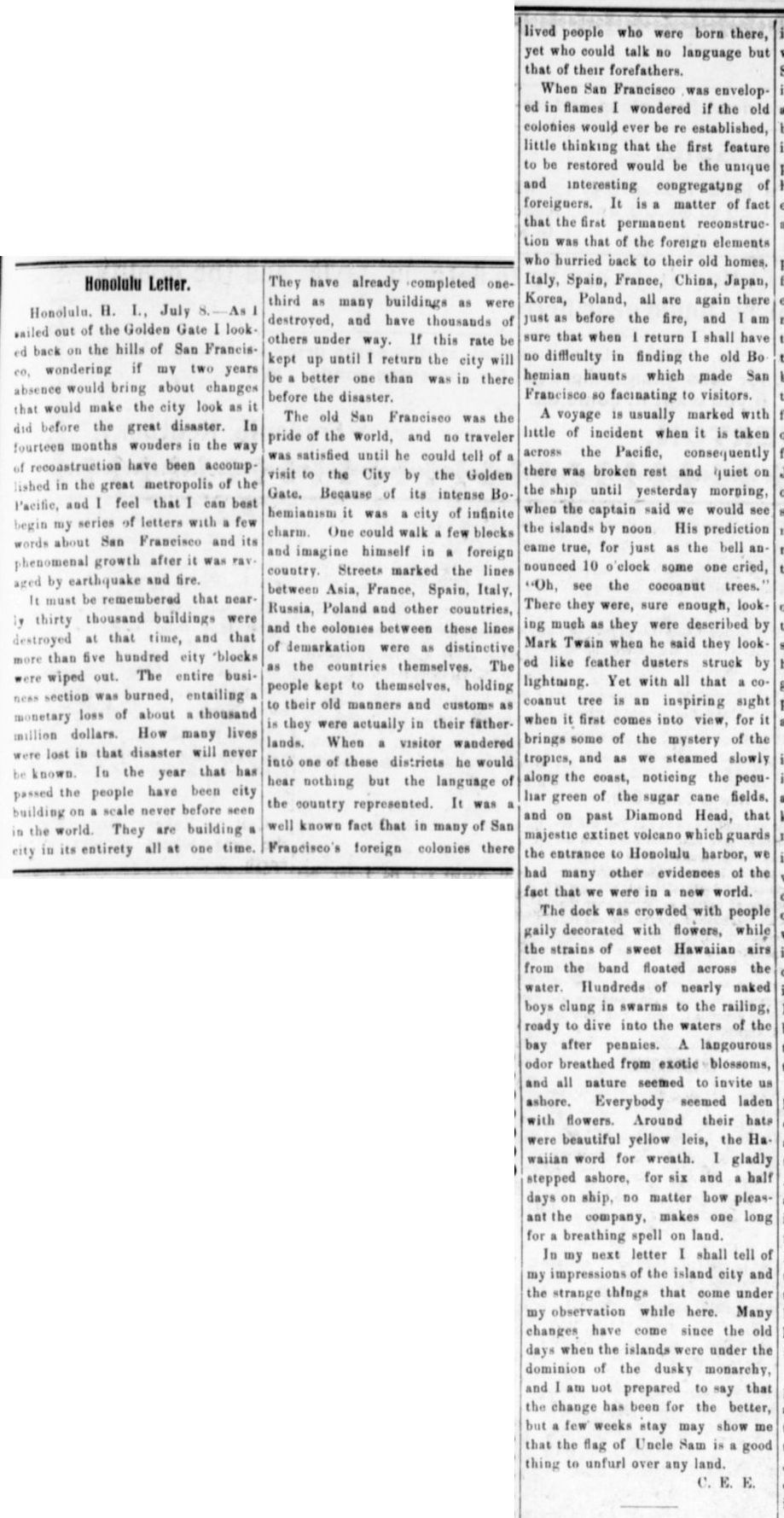July 8, 1907
Honolulu Letter.
Honolulu, H. I., July 8.--
As I sailed out of the golden Gate I looked back on the hills of San Francisco, wondering if my two years absence would bring about changes that would make the city look as it did before the great disaster. In fourteen months wonders in the way of reconstruction have been accomplished in the great metropolis of the Pacific, and I feel that I can best begin my series of letters with a few words about San Francisco and its phenomenal growth after it was ravaged by earthquake and fire.
It must be remembered that nearly thirty thousand buildings were destroyed at that time, and that more than five hundred city blocks were wiped out. The entire business section was burned, entailing a monetary loss of about a thousand million dollars. How many lives were lost in that disaster will never be known. In the year that has passed the people have been city building on a scale never before seen in the world. They are building a city in its entirety all at one time. They have already completed one-third as many buildings as were destroyed, and have thousands of others under way. If this rate be kept up until I return the city will be a better one than was in there before the disaster.
The old San Francisco was the pride of the world, and no traveler was satisfied until he could tell of a visit to the City by the Golden Gate. Because of its intense Bohemianism is was a city of infinite charm. One could walk a few blocks and imagine himself in a foreigh country. Streets marked the lines between Asia, France, Spain, Italy, Russia, Poland and other countries, and the colonies between these lines of demarkation were as distinctive as the countries themselves. The people kept to themselves, holding to their old manners and customs as is [if?] they were actually in their fatherlands. When a visitor wandered into one of these districts he would hear nothing but the language of the country represented. It was a well known fact that in many of San Francisco's foreign colonies there lived people who were born there, yet who could talk no language but that of their forefathers.
When San Francisco was enveloped in flames I wondered if the old colonies would ever be re established, little thinking that the first feature to be restored would be the unique and interesting congregating of foreighers. It is a matter of fact that the first permanent reconstruction was that of the foreign elements who hurried back to their old homes. Italy, Spain, France, China, Japan, Korea, Poland, all are again there just as before the fire, and I am sure that when I return I shall have no difficulty in finding the old Bohemian haunts which made San Francisco so facinating to visitors.
A voyage is usually marked with little incident when it is taken across the Pacific, consequently there was broken rest and quiet on the ship until yesterday morning, when the captain said we would see the islands by noon. His prediction came true, for just as the bell announced 10 o'clock some one cried, "Oh, see the cocoanut trees." There they were, sure enough, looking much as they were described by Mark Twain when he said they looked like feather dusters struck by lightning. Yet with all that a cocoanut tree is an inspiring sight when it first comes into view, for it brings some of the mystery of the tropics, and as we steamed slowly along the coast, noticing the peculiar green of the sugar cane fields, and on past Diamond Head, that magestic extinct volcano which guards the entrance to Honolulu harbor, we had many other evidences of the fact that we were in a new world.
The dock was crowded with people gaily decorated with flowers, while the strains of sweet Hawaiian airs from the band floated across the water. Hundreds of nealy naked boys clung in swarms to the railing, ready to dive into the waters of the bay after pennies. A langourous odor breathed from exotic blossoms, and all nature seemed to invite us ashore. Everybody seemed laden with flowers. Around their hats were beautiful yellow leis, the Hawaiian word for wreath. I glady stepped ashore, for six and a half days on ship, no matter how pleasant the company, makes one long for a breathing spell on land.
In my next letter I shall tell of my impressions of the island city and the strange things that come under my observation while here. Many changes have come since the old days when the islands were under the dominion of the dusky monarchy, and I am not prepared to say that the change has been for the better, but a few weeks stay may show me that the flag of Uncle Sam is a good thing to unfurl over any land.
C. E. E.
Source: Crittenden Record-Press. (Marion, Ky.) 1907-1918, October 17, 1907, Image 7 - Chronicling America - The Library of Congress.
[My comments are in brackets.]
